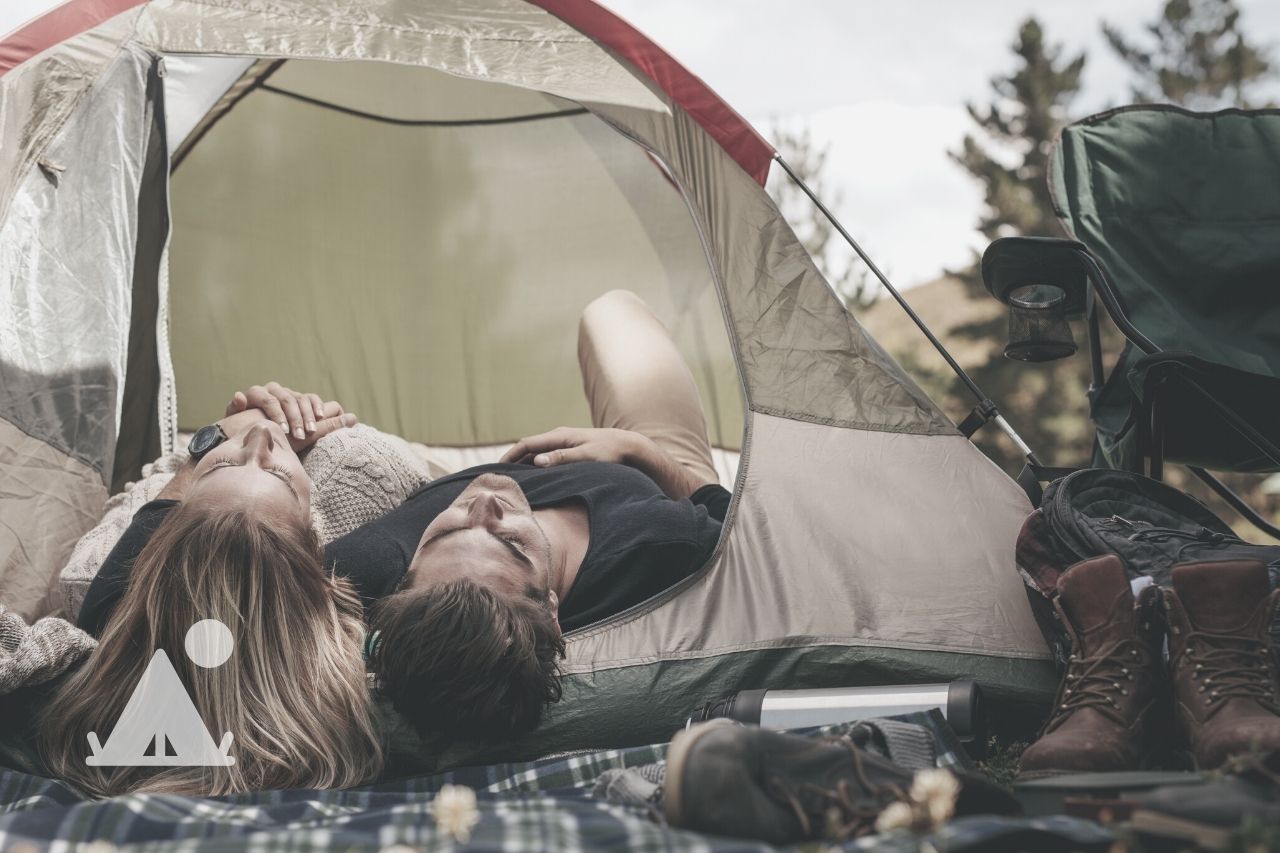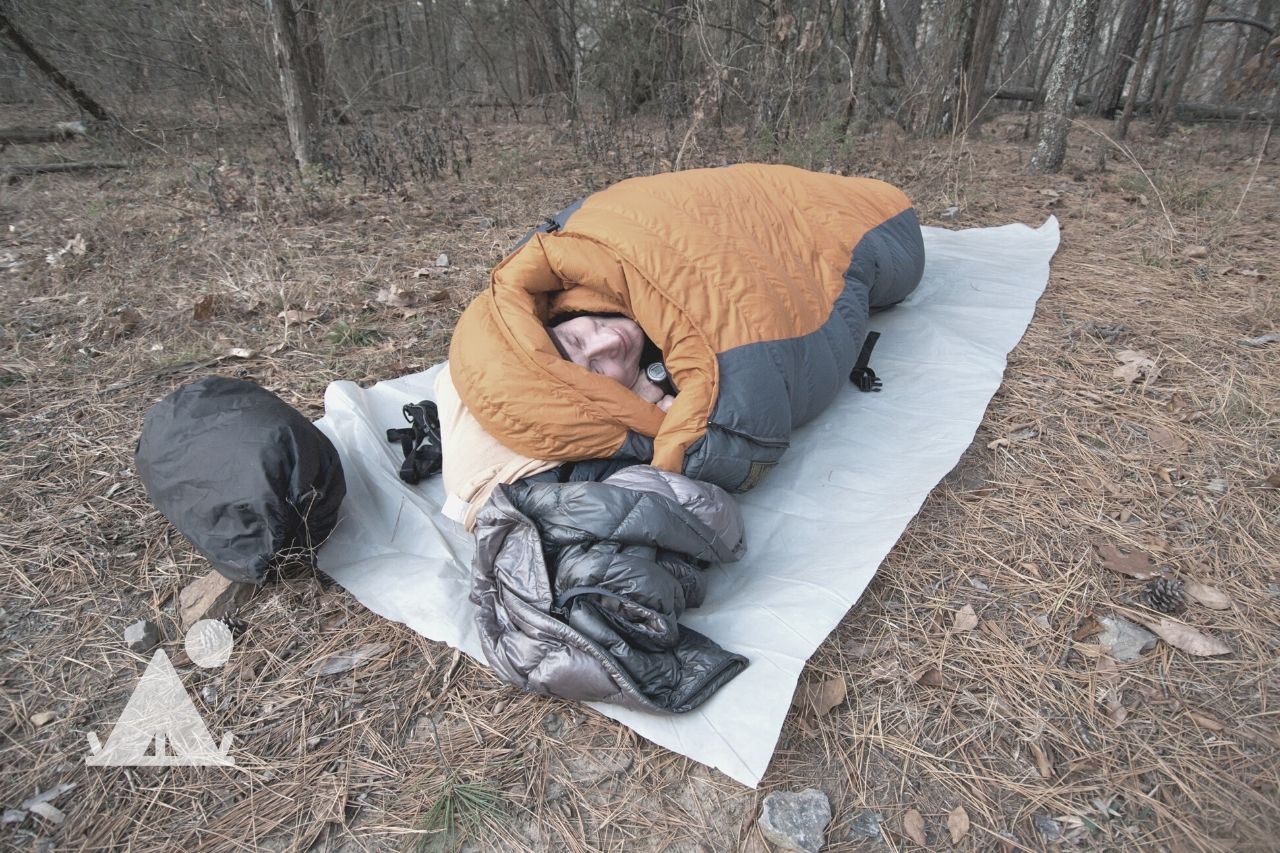Your nightwear when camping will be largely dictated by the weather. Whether it’s winter or summer, choose clothes that are comfortable, keep you warm, and absorb sweat. Below is a guide on what clothes to sleep in when camping plus additional tips for keeping your tent comfortable at night.
Can You Sleep In Your Pajamas When Camping?

You don’t need to go out and buy special nightwear for camping. The pajamas you wear at home are perfect for camping.
As long as they feel comfortable in your bed and don’t make you sweaty, they’ll also feel comfortable in a sleeping bag.
That said, it’s important to check the weather forecast. If it’ll be cold, you may need to layer on a fleece sweater or coat on top of your PJs.
And if it’s going to be warm, you may need to ditch your pajamas for something lighter.
What Clothes To Sleep In When Camping On A Warm Night?
When camping in a place that stays warm at night, your biggest challenge will be staying cool.
If you overheat, you’ll be sweaty and uncomfortable. The wetness from your sweat can actually make you cold if temperatures start to drop as the night progresses.
Here’s what we recommend:
- Sleep in just one layer of clothing. This can be a lightweight pair of PJs, long underwear, a pair of shorts and a tee, or just your boxer briefs and a top.
- Unless you get cold feet at night, ditch the socks and leave your feet bare. Because the body loses a lot of heat via the feet, it’ll help keep your entire body cool.
- Wear nightwear made from breathable, moisture-wicking, and fast-drying clothes. Synthetic or synthetic-cotton blend clothes are the best. If you have a bigger budget, wool clothes are also great to sleep in.
- If it’s extra-hot or you are a naturally hot sleeper, consider sleeping naked in your sleeping bag or under a quilt or blanket.
- Keep extra layers of clothing handy in case temperatures start to drop during the night. Make sure you can quickly slip on a fleece sweater or a pair of sweatpants.
What Clothes To Sleep In When Camping On A Cold Night?
When it comes to winter camping and cold nights generally, the trick is in layering. Dressing in layers provides better insulation and ensures sweat never touches your sleeping bag, which can reduce its insulation power.
Layering also makes it easy to adjust your dressing based on how cold it gets.
- Start with a thermal base layer. Long underwear consisting of long Johns and a long-sleeved top works great as a base layer. Thermal underwear traps heat against your body and absorbs sweat.
- Don’t forget to put on a thick pair of woolen socks. You’ll also need to protect your head and neck with a balaclava, gaiter, beanie or a knit hat. Do not stuff your head in the sleeping bag, as it can create condensation.
- If you have the right sleeping bag and a sleeping pad or two for insulation, a single layer of thermal wear might be enough to keep you warm. Unless it’s extra-cold, avoid overdressing.
- During extreme winter camping, long underwear may not be enough. You can add a sweatshirt on top, and if it’s really cold, wear a fleece jacket as well.
Sleepwear Tips For Camping

Here are a few other things to keep in mind when it comes to choosing the right clothes to sleep in when camping.
- Never go to sleep in wet or sweaty clothes, even if they are just a little damp. Wetness is one of your biggest enemies when trying to sleep warm. Always change into clean dry clothes.
- Here’s a tip for backpackers who want to travel light: instead of packing specific clothes for sleeping, sleep in a clean top and underwear that you plan to wear the next day. If it’s cold, you can carry a pair of sweatpants just for sleeping.
- Do not sleep in the same clothes you cook in. Fabric absorbs food smells that can attract animals, especially bears, into your tent. Change into your sleepwear once you’ve made and eaten your dinner.
- Always pack clothes for extreme weather. Forecasts could be wrong. Carry that fleece jacket or a pair of wool socks in case it gets colder than you expected.
- Avoid overdressing. You may feel warm and cozy at first, but it’ll make you sweaty and hot in no time. Dress lightly and only add an extra layer if you still feel cold after some time in the sleeping bag.
Can You Sleep Naked When Camping?
Let’s start by dispelling the myth that it is warmer to sleep naked in a sleeping bag.
If we are comparing sleeping in the nude to sleeping in clean and dry clothes (such as thermal underwear or PJs), sleeping with clothes will make you warmer.
Clothes add to the overall insulation of your sleeping bag, trapping more heat inside and keeping you warm.
If you sleep naked, your body will need to produce more heat to warm the sleeping bag. If it’s a cold night, you may never get warm.
Sleeping naked in a sleeping bag has a couple other downsides.
- Because your skin is in direct contact with the sleeping bag, oils and sweat can cause the down or synthetic fibers to clump. This reduces their insulation and you’ll get cold.
- Sleeping with clothes on ensures you are ready for any emergency such as an animal sniffing around the tent or a drunk fellow camper stumbling into your tent at night.
That said, there are situations where sleeping in the nude when camping is a good idea.
If it’s a hot night, sleeping naked will keep you cool.
If all your clothes are wet or damp, it’s better to sleep naked.
Some people also find they are more comfortable and sleep better when naked. In that case, we recommend adding a sleeping bag liner to prevent sweat and oils from reaching your sleeping bag.
How To Sleep Warm When Camping?
We’ve talked about the best clothes to wear when camping on a cold night. Here are some additional tips to stay warm.
- Carry the right sleeping bag. Make sure it is rated for the lowest temperature you expect at night. If you want to travel light while sleeping warm, we recommend a down sleeping bag.
- Get a sleeping bag liner. It can add 10-20 degrees to your sleeping bag’s rating and provide a moisture barrier between you and the sleeping bag’s insulation.
- Don’t go to sleep hungry. Eating a meal right before bedtime raises your body temperature.
- Get a sleeping pad with a high R value and place it under your sleeping bag. If it’s really cold, get two sleeping pads for double insulation.
- Insulate the ground using a tent footprint or ground tarp. Here’s a helpful video on how to set up a ground tarp for better insulation.
- If it is really cold, consider insulating the tent walls as well using reflective insulation foil. It will reflect heat back inside the tent, helping keep the entire space warm.
- Make sure you have the right kind of tent in the first place. For mildly cold nights in summer, spring and autumn, a 3-season tent will do. For freezing nights during winter camping, use a 4-season tent.
- Winter campers may also need to add a source of heat to their tent or sleeping bag. This can be a propane heater, an electric heater, a hot water bottle, or an electric blanket.
- Pitch your tent in an area protected from the wind and cold. Use trees or rocks as natural windbreaks.
How To Sleep Cool When Camping
In addition to the sleepwear tips we provided above for warm nights, here are a few other ways to stay cool when camping.
- Use a lightweight sleeping bag designed for use in warmer weather.
- If it’s too warm, ditch the sleeping bag completely and switch to a quilt or blanket. Another option is to use a sleeping bag liner on its own.
- Add more ventilation to your tent by opening the doors and windows. Adding a small fan to the tent will also improve airflow, which helps cool you down.
- If it is a hot and dry night, an evaporative cooler is almost as effective as AC and uses very little power. There are small portable evaporative coolers that run via USB. Do not use an evaporative cooler if it is very humid; it’ll not cool you.
- Drink a cold beverage before you go to bed. It’ll help bring down your core temperature.
- Use a 3-season tent with lots of mesh for ventilation.
- Check the weather forecast for wind direction that night. Pitch your tent such that the door faces the wind. Make sure you have an open window or mesh on the opposite side of the door to create a nice cross breeze.
These will not help you sleep warmer or cooler, but consider carrying a sleep mask and a pair of ear plugs when going camping.
A sleep mask is great if you are easily woken up by light, while ear plugs can help if every little noise in the bushes keeps you up.